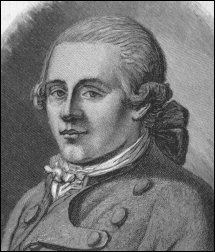The Influence of J.M.R. Lenz’s The Soldiers on Brecht’s Mother Courage and Her Children
Dramatic Effect/ Spectator
Neither Lenz nor Brecht were as interested in advocating a counter-system to Aristotelian poetics as they were in diffusing class distinctions and building a national audience. In a July 1775 letter to Sophie von de le Roche, Lenz described his goal of bridging the gap between the classes as “the whole plan of my life, my existence, my comedy writing, even someday of my death.”1 In the previous year in his lecture “On Götz von Berlichingen,” delivered to a literary society in Strasbourg, Lenz had prioritized weighing drama by its effect over adherence to rules. He condemned the stage of his day as overflowing with “nothing but masterpieces, which however, to be sure, are masterpieces only in the minds of their masters.”2 Humorously stated, this was his aversion for dramatic art as closed form, as exposition with the nothing-left-unsaid that didn’t allow for a spectator’s lasting participation. “For let us adopt another way of judging plays, my brothers,” he argued in the Götz lecture, “let us for a change look at their consequences, at the overall effect they have.”3 This casual statement is at the heart of Lenz’s iconoclasm: not judging plays by their adherence to classical parameters, as laid out by Aristotle or the French neoclassicists who dominated the discussion of drama in 18th century Europe, but by their ability to generate a spark of something new that the audience could carry out into the streets. Regarding the spectator effect, Lenz continued:
Therefore, cui bono? [for whose advantage?] What sort of effect do the products of all the thousand French geniuses have on our spirit, on our heart, on our whole existence? Heaven forbid I should be unjust. We take home with us a beautiful, delightful sweet feeling, as if we had downed a bottle of champagne—but that’s all. Sleep on it for a night and the whole thing’s wiped out again. . . .4
Though he denounces the theatre of feeling, judging emotionalism to be as transient as drinking champagne, he went on to ask for a theater of deeper resonances:
. . . .Where is the living impression, which afterwards mixes itself into attitudes, deeds, and actions, the Promethean spark that has stolen into our innermost soul so unnoticed that it fills our whole life with bliss, if we do not let it die away again by lying completely still.5
Lenz’s preoccupation with dramatic effect is expressed in his play The Soldiers itself. The fourth scene of Act I contains a lively and sexually frank coffeehouse debate between the army chaplain Eisenhardt and the Colonel (Count von Spannheim), Major Haudy, Officer Mary and others about the effects of attending the French theatre on the young military officers stationed in Armentières, Flanders. The chaplain has taken the position that the French theatre corrupts the intentions of the young officers toward the young women of the community. The debate grows heated after Haudy defends the theatre by saying that a single play, even “the worst sort of farce,” benefits not only officers but also the whole nation more than all the sermons the chaplain can preach in a lifetime.6 Eisenhardt responds by asking what, if anything, gentlemen might learn from the theater.
MARY: Oh, Lord do we always have to be learning something?
We enjoy ourselves, isn’t that enough?
EISENHARDT: Would to God that you did only enjoy yourselves,
that you didn’t learn anything! But in fact you emulate what is
represented on the stage and inflict calamity and blight upon our
families.
COLONEL: My dear Chaplain, your zeal is praiseworthy, but it
smacks of the cassock, if you don’t mind my saying so. What
family has ever been ruined by an officer? No doubt a wench or
two that deserves no better are put in a family way.
HAUDY: A whore will always turn out a whore, no matter whose
hands she falls into; if not a soldier’s whore, then a preacher’s
whore. (p. 11)
This is the first scene of several that features all men, military officers in a barracks-style discussion of sexuality. Using realistic dialogue unheard of in its day, with different registers of diction corresponding to the personalities of the officers rather than the uniformly elevated language of classicism, Lenz presents a spectrum of attitudes about the effects of the theatre on soldiers and the impact of a theatre-attending military on the community.
Scene Four is a meta-theatrical discussion that serves as reinforcement to the previous scene. The important Scene Three, already eluded to in regard to Zimmerman’s adaptation, has put forth an example of a theatre-going officer, the Baron Desportes, asking permission of a jeweler Wesener to take his daughter Marie to a see a twin bill of French plays: The Seeker of Wit and The Deserter (by Charles-Simon Favart, 1741; and Louis-Sebastien Mercier, 1770). The titles of the plays themselves, Lenz’s jest, offer commentary on the doomed chemistry of Marie and Desportes. Wesener refuses permission because of his daughter’s youth and because he is concerned with appear-ances. At the time, young women of virtue weren’t seen with military officers at the theater or elsewhere because the military’s ban against soldiers marrying left honorable intentions out of any such arrangement. Furthermore, as the soldier debate of Scene Four reveals, more is at stake for the Wesener family than appearances.
The scenes complement each other with a practical initiation and then a theoretical discussion of a storyline. Scene Three tugs the spectator inward toward the circumstances of the protagonist Marie Wesener and the main plot, and then Scene Four distances the spectator with the larger picture of the social issue being explored. This approach to the effects of the theatre, from within the context of a play itself, suggests the influence of the two major playwrights that Lenz translated: Plautus and Shakespeare. From both of these authors Lenz seems to have gleaned the “play within the play” approach of writing characters conscious of performing roles. Through soliloquies and asides, at the expense of theatrical illusion, stage-conscious characters blur the distinction between actor and spectator in order to provoke greater watchfulness. As the Officers in Scene Four evaluate the experience of theatre-going, the whole scene functions like an aside to the audience, who by attending The Soldiers, are in a similar position to the theorizing characters. Not only is the world a stage but the stage is a world where Lenz, through his layering of perception, abandons the classical justification for drama: Aristotelian catharsis. He substitutes his own justification: circumspection.
Continue reading



Recent Comments